1. Turn off your phone and revel in the mysterious
Don’t we all need a bit of time to be alone with our thoughts? Or to sit and share something that requires us to put away our phones and revel in something mysterious, beautiful and visceral? All music can offer us a haven for reflection, but classical music is constructed more like a narrative than a short lyric. You just need to give it time.
I find it upsetting that British politicians are afraid of revealing that they’re interested in culture. In Italy, where I conduct the Santa Cecilia Orchestra, the audience applaud when a senior politician comes to a concert. Classical music – and all culture – helps grow our collective awareness of what it is to be a human being. That’s a beautiful thing – why don’t we celebrate it? Conducting at the coronation proved what an extraordinary array of talent we have here in the UK, from gospel choirs to brass bands. How can their existence be so threatened? Music’s value and importance was there for everyone to see. I hope it provokes a real discussion for once. Classical music gets your brain as well as your heart going. How many things in life can do all that? Antonio Pappano, music director of the Royal Opera House. Pappano conducts Wozzeck there from 19 May.
2. The Tories should honour their £90m manifesto pledge
I grew up on a north London estate with no interest in classical music. But my life changed at 17 when I was given a ticket to hear a string quartet. I still remember what was played – Beethoven then Brahms (super boring, I thought). But then they played Ligeti’s Métamorphoses Nocturnes, written in the 1950s, a few years after most of his family had been killed in the Holocaust. It’s raw, brutal even, certainly not tuneful, and it completely captivated me.
I would never have been at that concert if it wasn’t for the Cavatina Chamber Music Trust, a charity that gives young people tickets to concerts. That experience inspired me to go to university to study music and put me on the path to where I am today. Everyone should have access to classical music. It enriches lives in so many ways.But it’s an expensive art form and without support – from charities, government, philanthropists – organisations will not be able to build future audiences, ticket prices will rise and classical music risks becoming the preserve of the few. We need a bigger cultural spend. I’d like to see a better settlement for the BBC and for the Arts Council. The government should supercharge philanthropy to make it much easier for private individuals to support the sector.
The last three or four years have been so difficult for the sector; it feels we have a perfect storm today. First the pandemic and then Brexit to contend with, and now high inflation, high energy costs and audiences are still slightly down on pre-pandemic levels. During the Covid crisis, the government’s £2bn rescue package kept many organisations alive. There’s no point in saving the cultural sector only to see it disintegrate now. I’d also like to see the government honour its manifesto promise of a £90m premium for arts education in schools. If young people aren’t exposed to it, classical music has no future. Jamie Njoku-Goodwin, chief executive, UK Music
3. Look to Europe and speak about the arts with pride
We need to shout more about the excellence and passion of our work. My experience of Europe, at the Bergen Philharmonic, suggests it takes greater pride in cultural establishments. Even people who don’t visit the opera house in their city feel it is theirs. It gives the city strength, identity, a sense of community. Governmentally, the arts should be spoken about with pride and confidence.
We now have an entire generation who weren’t offered music as part of their core curriculum. The educational and social benefits of arts education is proven. In my experience, the UK seems to engage with this less than any other European country. No orchestra on its own, hard as we work can make up for this vacuum and we all need music education reinstated as soon as possible. Edward Gardner, principal conductor, London Philharmonic Orchestra and chief conductor, Bergen Philharmonic.
Compare the billions Germany and France invest in the arts with our government’s £458.5m contribution. Culture is central to these countries’ psyche but our politicians are cowardly when it comes to promoting homegrown talent. Sarah Connolly, singer
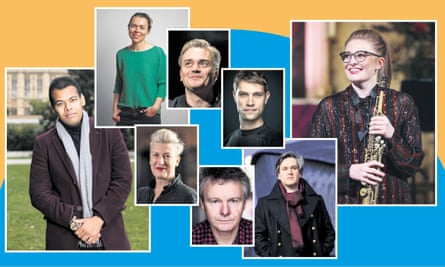
4. Young people need to see that musicians are relatable
I was lucky growing up. I was surrounded by classical music, and my parents showed my siblings and I different role models of Black excellence. All of it is for you and all of it is possible, my parents said. The most fundamental thing is to inspire people from a young age so they know that that classical music is for everyone. But music is expensive. There needs to be lessons in schools, and the means of allowing people from all backgrounds to experience itYoung people need to see that musicians are relatable. Social media is a great facilitator of that. I do a lot of work in schools: I play and talk and answer questions. Children see that I’m also a human being – and they could do what I do. How these events are marketed also seems to me to be crucial. Organisations need to reach out to different audiences and convince them that all music is for them. You can have a Black musician playing Beethoven and a white musician playing Florence Price, both composers are just as accessible and just as appealing. We grew up playing Bach and Brahms and Schubert and didn’t have any preconceptions that this wasn’t ‘for us’. The emotion in their music, even though it was written hundreds of years ago, can be related to.Isata Kanneh-Mason, pianist
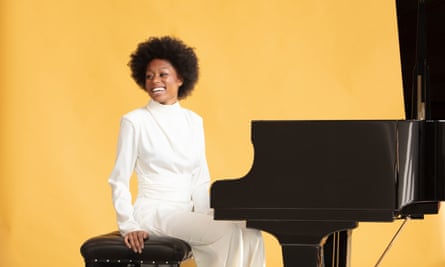
Working alongside more artists of colour in recent years has been an integral part of my development as a musician. Diversity can be a loaded term, and it encompasses socio economic background to sexuality, to gender, race and disability. But essentially it’s just people.I’d like to get to where society is better reflected throughout the industry – music is about the human experience and every human should be able to access and make it. The industry is already doing so much to invite in different communities and work on stories that impact people today, but there is still a need to engage with organisations to enable them to find different creators of different backgrounds. So much of this is down to resource.The changes need to be systemic, backstage as well as on stage. If you have a greater breadth of people on your board, the work you produce is going to change. Matthew Kofi Waldren, conductor and co-founder of Your Turn Collective
5. Rethink the finances to ensure musicians get a fair fee
A composer’s life in the UK is hard. For most of us, fees are too low, and organisations are struggling to justify commissioning new work when they’re trying to stay afloat. It’s increasingly rare to find young composers from working-class and diverse backgrounds. The destruction of music education in our state schools, BBC job cuts, ACE’s funding cuts (disproportionately affecting new music), and the general undermining of the arts make the dream of a career in music seem unattainable.
We need people in classical music from all walks of life but we shut them many due to their lack of financial privilege. Musical organisations need to focus their energies on sourcing co-commissioners to fund their projects, spreading the financial responsibility of the commission, ensuring a fair fee for the composer and guaranteeing repeat performances. Who wants to live in a world where the only composers are those whose parents can pay their rent? Gavin Higgins, composer
6. Nurture the grassroots, from choirs to brass bands
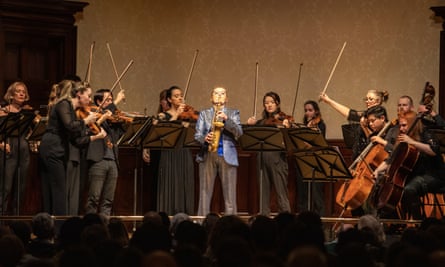
Growing up in Cumbria, opportunities to experience live music weren’t ample but I picked up the saxophone at the Barracudas Carnival Arts Centre aged seven and I was hooked. It was a place that embraced anyone who wanted to be part of dance, music or stilt-walking. Music is a living, breathing art form and, often, once experienced never forgotten. Letting young people be the music is often an ideal starting point.As with sport, the ecosystem of our community relies on music being supported at every level – from local choirs and county orchestras to symphony orchestras and brass bands. In a fragmented world, we need these musical spaces to allow communities to come together with a shared mission and so nurture the audiences of tomorrow. Jess Gillam, saxophonist and broadcaster
7. Schools must go beyond the whole-class ukulele craze
Sustained investment in schools is at the heart of this, but it’s also about upending the entrenched disparagement of classical music in wider society. “It’s not for me” has to be turned into “I can’t live without this”. This has to happen from the earliest school years. There should be free or inexpensive instrument tuition beyond the whole-class ukulele craze (a dead-end for populating orchestras of the future).
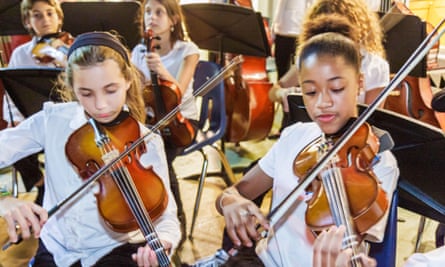
There should be regular encounters with exceptional live performance with affordable school-to-venue transport, and a massive upscaling of things like the once well-funded national Sing Up programme. We should train all early years teachers to be confident meshing music into the curriculum – teaching them to play the piano, for the leading of class singing, would be transformational. Meurig Bowen, director, Britten Sinfonia
8. Do a conga to Beethoven’s 7th
At Aurora, we’ve found creative concert presentation to be a powerful tool in engaging a broader audience for the orchestral music we love, whether playing among 2,000 people at Printworks nightclub, inviting 100 people to create a giant graphic score during a concert, or playing from memory. At one show, the whole audience formed a spontaneous conga line to the slow movement of Beethoven’s Seventh.
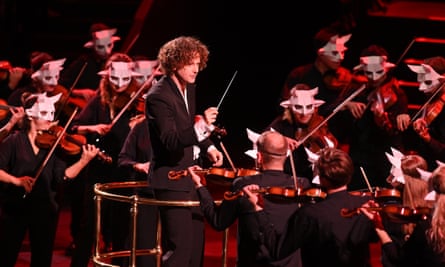
The whole industry is engaging with this question: take a look at the Orchestra of the Age of Enlightenment’s Night Shift series, which sees the orchestra perform informally in pubs; the Budapest Festival Orchestra’s concerts where audiences can sit on beanbags among the orchestra; or theatrical projects such as the Scottish Ensemble’s Goldberg Variations, which saw musicians and dancers share a stage as equals. Jane Mitchell, principal flute and creative director, Aurora Orchestra
9. Escape the elitist shoebox and hit the village hall
Ultimately, opera is about the human condition: love, loss, grief, guilt, family. Yet the situation we’re facing now in the UK is that there’s less opera, and potentially less opportunity for companies to take risks. Not everyone is going to want to come to opera, but we need to create an environment where anybody can feel they can. Matthew Kofi Waldren
Opera is being forced into an elitist shoebox. It can and should be found in village halls as well as opera houses, but the 30% funding cuts and cultural deficit in education mean that many communities are unable to experience it. If you remove the education, then you don’t get the supply of musicians, and the elitism and discrimination opera is accused of becomes a self-fulfilling prophecy.
Singers, too, are suffering. I began my career with the BBC Singers, then worked with Glyndebourne Touring Opera (not able to tour this year because of ACE cuts) and then English National Opera. All these avenues have been destroyed or compromised. In France or Germany, say, opera is not a dirty word. I’m sure not all politicians like pop music or football, yet they are always happy to be associated with those things. Why not classical music? Sarah Connolly
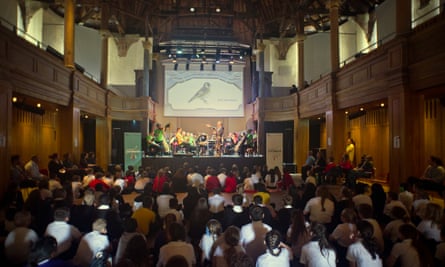
10. Put it on prime time – after all, The Piano was a hit
The reason classical music is seen as a luxury is because it’s not readily available on mainstream media. Channel 4 has just had a surprise hit with The Piano, which obviously connected on a mass level emotionally. We tend to keep the personalities of fine artists on a pedestal as if exposing them to the masses might dilute their magical powers. If Lennie Bernstein could once hold our hand through a piece on primetime TV, why don’t we encourage a more human connection with the artist themselves? Nicky Spence, singer and broadcaster

